| |||||||||||||||||||||||||||||||||
| Facts > Pagan Christs > Isis and Osiris | |||||
| Glycon | Simon | Apollonius of Tyana | Pythagoras | Orpheus | |
| Isis / Osiris | Dionysus | Zalmoxis | Kore | Samothrace | |
| Heroes | Attis | Adonis | Mithras | Other godmen |
| Osiris 2,000 BC—a dying, resurrected savior |
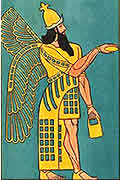
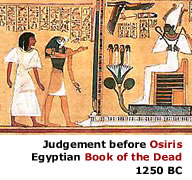
"But when these souls
are set free and migrate to the realm of the invisible.. then this god
becomes their leader and king" Was Jesus new? Was Jesus unique? Lets talk about the Pagan godman Osiris. The Egyptians worshiped thousands of divinities; Osiris was the God whose myth was most widespread. He was a Big Name God. |
|
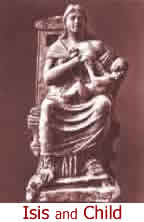
Dating Isis / Osiris Isis and Osiris are so old they fade back into pre-history. Egypt the written (chiseled!) record of the God dates from the third millennium BC. Greece An inscription found in Piraeus, the port of Athens, records a temple to Isis / Osiris already there in 333 BC. Rome The religion was introduced to in the city of Rome in the first century BC. Osiris was worshiped in traditional temple worship and in Mysteries that were famous throughout the ancient world, celebrated not just in Egypt but in Greece and Rome. You've heard of Herodotus, Plutarch, Pythagoras, Plato? They each traveled to Egypt and were each certainly familiar with the worship of Osiris first hand. Some scholars point to ancient evidence that they were all actually initiates in the Mysteries of Osiris, though, frankly, there's room to argue the point. "In the first of these [intercalary] days Osiris was born, and at the hour of his birth a voice issued forth saying, "The Lord of All advances to the light." ....Zeus bade [Pamyles] proclaim with a loud voice that a mighty and beneficent king, Osiris, had been born, for which Cronus entrusted him the child Osiris, which he [Zeus] brought up."
Osiris' mother was the Goddess Rhea, his 'biological' father was the God Hermes, but he was raised by the great God Zeus. (Remember the Osiris legend dates from the 3d millennium BC, so it has very archaic elements.) Plutarch tells the story >> "...he [Osiris] traveled over the whole Earth civilizing it, without the slightest need of arms, but most of the peoples he won over to his way by the charm of his persuasive discourse. "
Osiris traveled the world doing good deeds:
Plutarch explains:
The details of Osiris' myth are complicated and, to us, silly. Other peoples' myths are always silly. But the core of the myth is familiar: the God is killed and (eventually) resurrected, after which he becomes immortal and goes into the beyond to be the God of the dead. The Discovery of Osiris [Inventio Osiridis] was the great autumn festival of the religion. It celebrated the death of the God on October 28th, and His resurrection on November 3rd. On the first day of the festival the faithful, dressed in black, chanted laments, beat their breasts and cried out with grief as they joined Isis (the wife of Osiris) in mourning the death of the God. "A great shout arises from the company for joy that Osiris is found"
A ritual search for the Osiris' body mimicked Isis' search for Him. The body—a disassembled idol—was found and reassembled, as Osiris' dismembered body had been. Then, on November 3d, the faithful joined a joyous procession through the streets to celebrate the Hilaria --the dead God had been reborn. "...the rites celebrated by night agree with the accounts of the dismemberment of Osiris and his revivification and regenesis." [Plutarch, Isis and Osiris, 364] The
Mysteries of Isis and Osiris Wow! |
|
When initiates into the mysteries of
Isis and Osiris died, their souls traveled to Heaven and Osiris
became their king. How do we know this? The ancients
tell us so. Here's Plutarch [who lived from about
45 to 120 AD]
|
"But He Himself is far removed from the earth, uncontaminated and unpolluted and pure....but for the souls of men [on earth]...there is no association with this god except. a dim vision of his presence....But when these souls are set free and migrate into the realm of the invisible and the unseen, [i.e. when people die] the dispassionate and the pure, then this god becomes their leader and king...." [Plutarch, Isis and Osiris, 382- 383] And, quoting Theopompus, "... finally Hades shall pass away; then shall the people be happy, and neither shall they need to have food nor shall they cast any shadow." [Plutarch, Isis and Osiris, 370] |
|
And it wasn't just Plutarch who wrote about salvation through Isis and Osiris. |
"The keys of hell and the guarantee of salvation were in the hands of the goddess, and the initiation ceremony itself a kind of voluntary death and salvation through divine grace." [Apuleius, Metamorphosis, Book 11, 21]
And, "Be of good cheer, O initiates, for the god is saved, and we shall have salvation for our woes." [Firmicus Maternus, The Error of Pagan Religions, 22.1] Quoting the Goddess Isis: " I have come with solace and aid. Away then with tears. cease to moan. Send sorrow fleeing. Soon through my providence shall the sun of your salvation rise." [Apuleius, Metamorphosis 11.5] |
|
The next time you're in Church Wow! |
Baptism and Eucharist: initiation into the Mysteries of Isis / Osiris began with the priest reading to the initiate from the ancient sacred books. Then the priest led the initiate to a bath near the temple, where he (or she, the Mysteries were open to either sex) bathed. After bathing he was sprinkled with purifying water brought from Nile. The priest then led the initiate, dressed in new linen robes, to "the remotest part of the sanctuary" where he was shown the sacred Mysteries. What they were we don't know—this part of the ceremony was kept secret on pain of death. |
What the
initiation meant was written about: death, rebirth and salvation.
Having completed the voluntary death [voluntariae mortis] and sacred birth [natalem sacrorum], the initiate became a new man. The ceremony ended two days later with a sacramental meal. |
"I approached the frontiers of death and, having walked on the threshold of Proserpine [the home of the dead], I returned."[Apuleius, Metamorphosis, Book 11, 23], and, "The keys of hell and the guarantee of salvation were in the hands of the goddess, and the initiation ceremony itself to the form of a kind of voluntary death and salvation through divine grace." [Apuleius, Metamorphosis, Book 11, 21], and "Be of good cheer, O initiates, for the god is saved, and we shall have salvation for our woes." [Firmicus Maternus, The Error of Pagan Religions, 22.1]. |
|
The next time you're in Church Wow! |
Differences
Believing scholars like to bring up differences between Jesus and the earlier Pagan godmen. Attis' faithful hung his likeness on a pine tree, not on a cross, so Jesus can't be Attis. Osiris mother was a Goddess instead of a mortal woman. Believing scholars are right, Jesus wasn't Attis, and He wasn't Osiris. Jesus was a "new" God, the same way the first Honda Accord was a new car. He was a "new" version of God, built from old ideas.
Good Books for this section
Isis
and Osiris
|
This is the same Plutarch who wrote Plutarch's Lives. Like Solon, Plato and Pythagoras before him, when he wasn't biographying Plutarch traveled to Egypt and studied the mysteries of Isis and Osiris—probably even got initiated (though he doesn't say for sure). Isis and Osiris, at just over 90 pages, is modern scholarship's main source for the goodies on one of the ancient world's big name Pagan religions. This Loeb translation is pretty easy to read. And fun. You'll discover "accounts of the dismemberment of Osiris and his revivification and regenesis" [Isis and Osiris, 365]—His death and resurrection! Wow. Be careful, there are a bunch of P's Moralias in print at Loeb and elsewhere. For Isis and Osiris, you want number V, which is Loeb #306.
|
| |
The
Golden Ass
|
The ancients had novels (who knew?!), and this is one of them. And, believe it or not, it's a fun read, lighthearted, funny, and well written. The story moves. For the boys: it even has explicit sex. Amazing. Who knew?! The story is about Lucius' adventures after he gets turned into a donkey. The first ten chapters are just fun, not related to the Pagan origins. Chapter eleven is about Lucius in Egypt, and his study and initiation into the mysteries of Isis and Osiris (he's a man again by this point). For the ancients these mysteries were sacred secrets—believers would and did die rather than reveal them. Apuleius' novel is the only surviving text that comes close to describing the mystery initiation ceremony. Apuleius also says initiation brought salvation: "The keys of hell and the guarantee of salvation were in the hands of the goddess, and the initiation ceremony itself a kind of voluntary death and salvation through divine grace."
|
| |
Death and the Afterlife
in Ancient Egypt
|
A glossy coffee table book full of beautiful pictures of Egyptian Gods taken from surviving papyruses, etc., and, who'd a thunk it, of lots of fun scholarly information about ancient Egyptian religion. Surviving ancient texts, including Egyptian book of The Dead and the Pyramid Texts, etc. describe an afterlife of happiness for good people and torment for bad people, mediated by the great savior Gods Ra and Osiris. The Egyptians had not one soul, but several—the ba, the ka, the shadow, the name—all of which survived death. A well written, pretty, wonderful book, if you like this sort of thing.
|
| |
The Egyptian Book
of the Dead
|
This is the original text of a famous and revealing collection of ancient spells the Egyptians put in tombs along with the dead guy. The idea was for the dead guy to use the power of the magic spells as a guide and tool in the complicated Egyptian afterlife. Yes I know that sounds sounds silly, but the book tells us a lot about Egyptian religion—including the Egyptian savior Gods Ra and Osiris. The famous Chapter 125 describes Osiris' believers standing before Osiris after death, to be judged according to the life they lead, seeing if they would to make it into Egyptian Heaven or end up suffering in Egyptian Hell.
|
| |
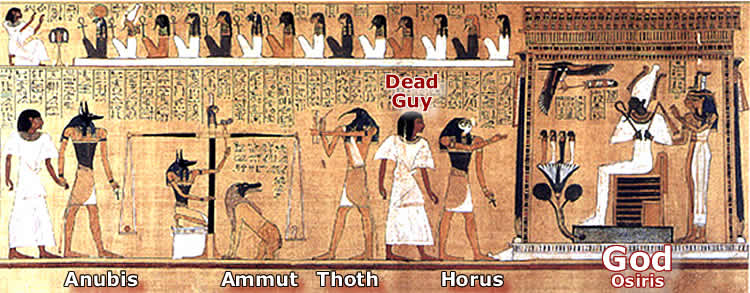
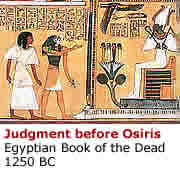
 When they get to the part about God dying and being resurrected,
remember the great pagan festival of the Discovery of Osiris.
You'll know
When they get to the part about God dying and being resurrected,
remember the great pagan festival of the Discovery of Osiris.
You'll know 
 And
the good thing is, you don't have to believe me, you can read
it for yourself.
And
the good thing is, you don't have to believe me, you can read
it for yourself. 


